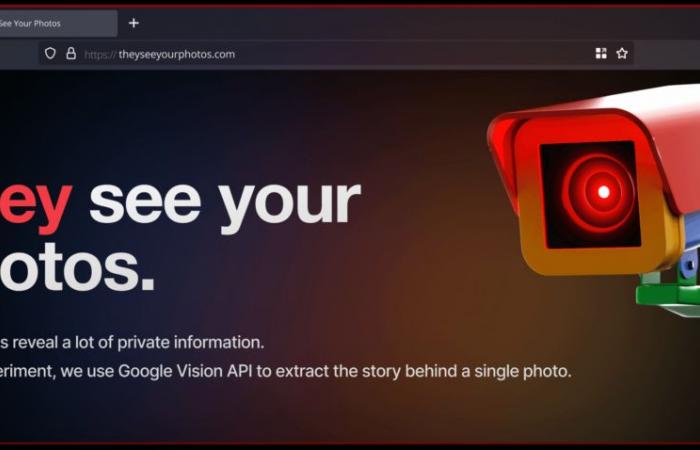The developers of Ente, an open source photo gallery application which was our application of the month, had an interesting idea. On the “They See Your Photos” site, they are launching an experiment via an API used by Google Photos. Objective: extract the caption and story from a photo sent to their service. Interesting…sometimes even scary.
Le site TheySeeYourPhotos.com (They See Your Photos) is an initiative that aims to raise awareness about the access and analysis that big tech companies potentially have over your private photos. Objective: to generate debate around important questions about confidentiality. Because yes, what you consider to be simple memories can be carefully analyzed, classified and potentially used for other purposes (advertising in most cases, surveillance in others).
How does it work?
In summary, TheySeeYourPhotos.com mainly serves to expose and explain how certain large technology companies can analyze your images in depth, and thus raise public awareness of the issue of confidentiality and the protection of personal data. The underlying message is to encourage the adoption of more transparent, encrypted and privacy-friendly solutions, such as those offered by Ente.
We tested it with a royalty-free photo from the Pixabay site. The result (given in English only) is astonishingly true.
What the Google Cloud Vision API “sees”
Created by Ente, this site uses theAPI Google Cloud Visionan online service that uses artificial intelligence to understand what's in an image. It can recognize objects, animals, landscapes, but also detect faces, extract present text and even identify famous places. By analyzing a simple photo, this API can provide very precise labels that describe its content.
In practice, this means that a web service that uses this API can take your images and automatically classify them, find text, spot brand logos or filter potentially inappropriate content. For example, if you put a photo of a dog in a park, the API will say that there is a dog, a green space, even recognize the breed of the dog, and all this without any human intervention.
Why is this important?
This type of tool highlights the immense analytical capacity of technology companies on your data. It shows how much they can know about you just by looking at your photos.
On the one hand, the site intends to demonstrate education on the confidentiality of photos published online. The site seeks to show in a concrete and didactic way what types of information can be extracted from your personal images when you store them on online services. These include, for example, face recognition, location detection (GPS data), object identification, scene classification, or even visual context analysis. In other words, it highlights the fact that these platforms can “see” and understand much more than you could imagine from your simple snapshots.
On the other hand, Ente wants raise awareness of privacy risks. Beyond the purely descriptive aspect, the site invites reflection on the issues and risks for privacy. By showing concretely how your photos, when entrusted to mainstream cloud services (Google Photos or its equivalent at Amazon), can be analyzed, sorted, or even potentially sold to third parties or used for advertising targeting purposes, TheySeeYourPhotos.com draws attention to the need to rethink the choice of our storage and sharing tools.
Well-ordered charity
Ente also sees its interest in this: the project is open source, but also commercial, since the online photo and video hosting service markets hosted solutions.
If you use the Ente Cloud (encrypted), you benefit from storage space 5 GB free storage. However, to support the publisher's economic model, paid solutions are offered: they range from 50 GB for €2.49 per month to 2 TB for €19.99 per month.
If you want to get 10 GB extra for free and you have a paid account, use the following code: SB7XWT. Use this code in your mobile app (General / Referrals) once your plan is activated.
I like this:
I like loading…






